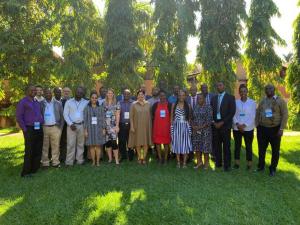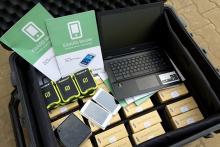WHO builds capacity of Priority Countries to use Early Warning, Alert and Response and Go.Data tools in Disease Outbreak Response
Entebbe 14th May 2019: The World Health Organization (WHO) is conducting a five-day orientation training to build the capacity of participants from priority countries through theoretical and practical training on two WHO supported tools for epidemiological surveillance and response activities, EWARS-in-a-box and Go.Data.
The participants in this include core surveillance, epidemiological and technical staff involved in incident management drawn from Ministries of Health in the Democratic Republic of Congo, Nigeria, South Sudan and Uganda; WHO Health Emergencies programme in the African Region; WHO country offices of Democratic Republic of Congo, Nigeria, Rwanda, South Sudan and Uganda; African Field Epidemiology Network (AFENET), Médecins Sans Frontières (MSF) and the Uganda Virus Research Institute (UVRI). The training participants will be expected to assist in the rollout of similar training in the African region as well as utilize the skills and knowledge gained during emergencies.
In this training, participants are being oriented on the strategy, objectives, and functionality of the EWARS in-a-box tool, building their capacity to use the tool, including setting up, mobile data reporting, alert management, automated analysis, and bulletin production. In addition, the participants will be familiarized with the Go.Data software, build their skills in field data collection using Go.Data for data management, contact tracing and building transmission trees to visualize chains of transmission.
As a result of the recurring health emergencies in the African region, the need for appropriate outbreak response tools during complex emergencies has been identified. During emergencies, existing national public health surveillance systems may be underperforming, disrupted or non-existent. They may quickly become overwhelmed to adequately meet the surveillance information needs of a large-scale outbreak or humanitarian emergency. In addition, existing tools may not be comprehensive enough, or address requirements in the field during emergencies, leading to proliferation and fragmentation of data collection at the frontline.
As part of addressing some of the gaps identified during emergencies, WHO developed ‘EWARS in-a-box’ to strengthen early warning, alert and response in emergencies and Go.Data to support and facilitate outbreak investigation including field data collection, contact tracing and visualization of chains of transmission.
EWARS-in-a-box was designed by WHO to improve disease outbreak detection in emergency settings, such as in countries with conflict or following a natural or man-made disaster. Thus, EWARS-in-a-box is a collection of all the equipment needed to rapidly establish early warning, alert and response activities, particularly in difficult and remote field settings without reliable internet or electricity. Since 2015,
EWARS-in-a-box has been operational across four WHO regions and over a dozen emergency settings, including emergencies in Chad, Ethiopia, Nigeria, DRC, South Sudan and most recently in Mozambique.
The Go.Data tool was developed by the Global Outbreak Alert and Response Network (GOARN) and coordinated by WHO. WHO worked with GOARN partners to design, develop and deploy a comprehensive software to be used globally by WHO, the Member States and Partners. The software supports and facilitates outbreak investigation including field data collection, contact tracing and visualization of chains of transmission. The tool is being rolled out and the African region has been identified as a priority in this process.
The rollout of the training in the African region will strengthen early warning surveillance and response during emergencies.




